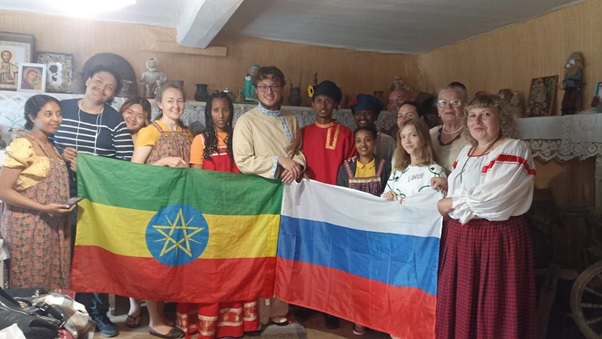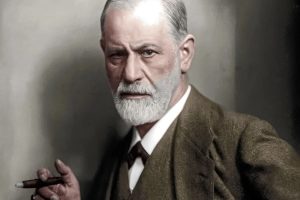
(Part II)
Gumilyov was a passionate traveller, exceedingly interested in Africa, and many of his works are a reflection of the poet’s impressions of his wanderings, which is why the popularisers of his work try not to be limited to Russia alone. Director of the Small Development Fund of historical cities, Yuri Shchegolkov, said that the exhibition of paintings and his travels to Africa were already demonstrated in Egypt (in Hurghada, Cairo and Alexandria) as part of the exhibition “In the footsteps of N. Gumilyov.” Unfortunately, this project was interrupted by the COVID pandemic period, but there is a planned idea to arrange a traveling exhibition and demonstrate it around, following in the footsteps of N.S. Gumilyov in Djibouti and Ethiopia, organizing exhibitions in those cities that he visited, as well as conducting cultural and historical seminars.
A monument to the Gumilev family was erected in Bezhetsk, where Nikolai Stepanovich is immortalized in a bust. Negotiations with the authorities of the city of Kronstadt are also underway to install a monument to Gumilyov, where N.S. Gumilyov appeared to be born into the family of a ship’s doctor, state councilor S.Ya. Gumilyov. However, organisers of the expedition in the footsteps of Gumilyov, have even more ambitious plans to preserve the memory of Nikolai Gumilyov in Ethiopia. But to do this, you need to do the most obvious thing first – organise translations of the poet’s poems into Amharic language so that the significance of the poet’s personality can be appreciated by the Ethiopian public.
In summer of 2023, at the invitation of the festival organisers and thanks to the efforts of the Centre of Public Diplomacy, a group of Ethiopian students came from Moscow to the Gumilev Festival in Bezhetsk. They left having an unforgettable impression by the reception they had and the events themselves. Some of them have already participated earlier in the evenings, dedicated to Gumilev, which were organised by the Gumilyov Society. But most Ethiopian participants never heard the names of Gumilyov and Akhmatova before.
Iosif Belaneh, student of RUDN and Adimasu, student of the Engineering Institute, underline: “We had the incredible opportunity to immerse ourselves in Russian culture and learn about the rich history of this city. We were able to discover how the city lived and heard fascinating stories of important people who had left their mark on its development. This was a unique opportunity which many Russian have not had. We were happy to share with the locals our culture and traditions that they could know Ethiopian culture better. Most of them have never seen foreigners”.
Thus, that’s the goal of public diplomacy – to introduce each other’s culture, significant for history of two countries by names, especially if these names are capable of playing an important role in bringing our peoples closer together. Ethiopian students participated in all festival events – singing, dancing, reading poems by Gumilyov and Akhmatova. For the population of Bezhetsk this festival has become a great cultural event. The main thing now is to support this initiative, so that the festival turns into a good tradition, and perhaps even into a conceptual tourism product. As for students from Ethiopia, for them this festival is another opportunity to get acquainted with outstanding personalities, which are uniting Russia and Ethiopia.
If Ethiopia could organise a traveling exhibition, dedicated to the work of Gumilyov and his travels around the country, arrange translation of his best poems and poems dedicated to this African country, then Gumilyov could again become a link between our peoples.
Culture is, of course, not a profitable infrastructure project, but also a product, which can be sold commercially. These, at first glance, costly, but cash-strapped projects can also be very effective in the short and medium term perspective. And the real and visible result of these projects will be the establishment of good relations between our peoples, the revival and development of friendship societies.
Horizontal connections turning into economic projects for small and medium-sized businesses and even jobs are what are needed today, without looking back to big politics. For such projects to be successful, along with financing, there must be also a sincere interest in other cultures and peoples, which helps building reliable and strong relationships. This applies not only to the Russian side,
which in this case takes the initiative of developing the figure of Gumilev into a cultural and literary bridge between our countries. We also appeal to the Ethiopian side to respond and actively contribute to this initiative. As has already been said, for starters, let us organise a competition for translations of Nikolai Gumilyov’s poems into Amharic language, as well as the continuation of the literary festival themes dedicated to the travelling routes and various commemorative events not only in Russia, but also in Ethiopia.
July 2023, Tver region, Linen corner
At the end it would be logical to make readers to get an impression about Gumilev’s poetry.
BY AUTHORS: Tatyana Jolivet, Director of Center for Public Diplomacy
Andrey Khrenkov, PhD in History, Institute of Oriental Studies of the Russian Academy of Sciences
THE ETHIOPIAN HERALD SATURDAY 9 DECEMBER 2023





